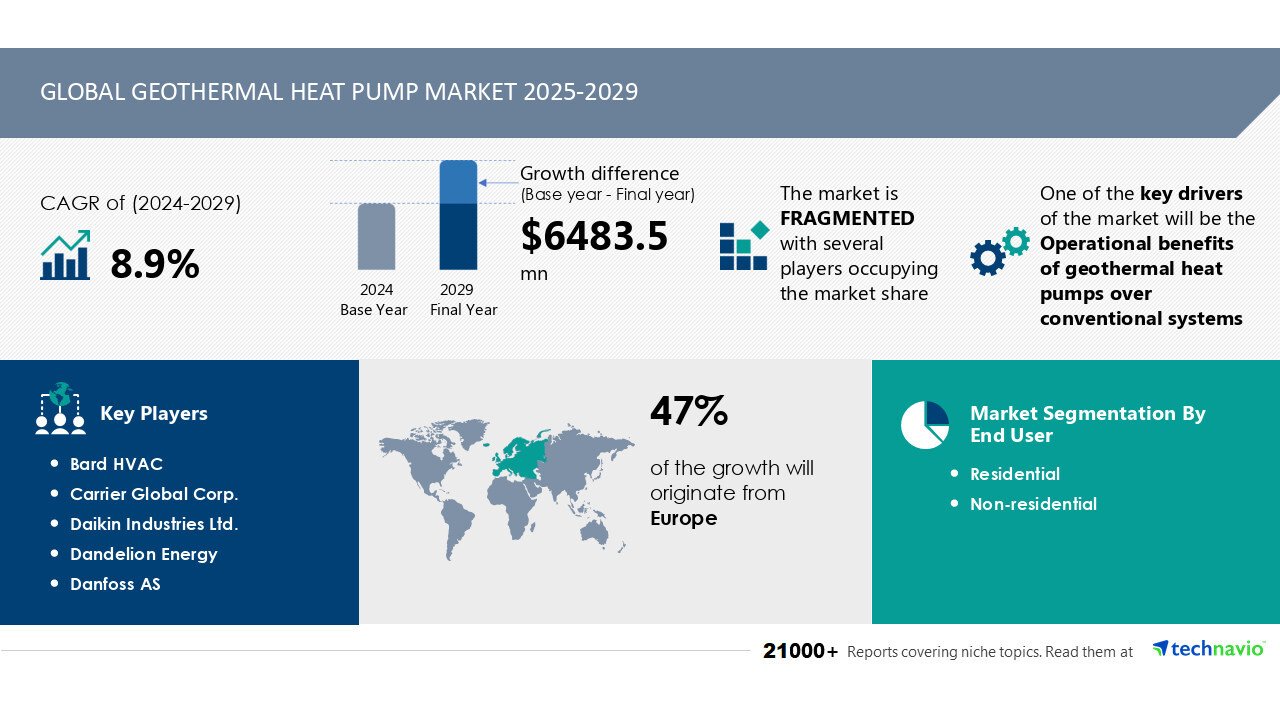The global geothermal heat pump market is projected to grow by USD 6.48 billion between 2025 and 2029, according to a report by Technavio. The market is expected to register a compound annual growth rate (CAGR) of 8.9% during the forecast period. Key factors driving this growth include the increasing demand for energy-efficient solutions and the rising adoption of Building Energy Management Systems (BEMS).
Geothermal heat pumps (GHPs) offer significant operational advantages over conventional heating and cooling systems, including energy savings and environmental benefits. The technology uses the earth’s natural heat to warm buildings in the winter and provide cooling in the summer. Closed-loop and horizontal system configurations are particularly popular due to their efficiency and durability.
Market Drivers
The rising need for energy efficiency, combined with cost savings in residential and commercial sectors, is boosting the demand for geothermal heat pumps. The integration of Building Energy Management Systems (BEMS) further supports market growth, especially in regions like the United States and China, where governments have introduced energy regulations and labeling programs to encourage eco-friendly practices.
Additionally, the global push toward sustainability and carbon reduction has led to increased adoption of renewable energy solutions. Government incentives, subsidies, and financing programs are helping to offset initial installation costs, making geothermal systems more accessible.
Market Challenges
Despite its benefits, the geothermal heat pump market faces challenges related to high upfront costs. Installing geothermal systems requires specialized drilling equipment, underground piping, and potential electrical system upgrades, which can deter potential buyers. In response, government bodies and industry players are offering tax credits, rebates, and new financing options to lower the barrier to entry.
Location is another critical factor. Not all areas have suitable geothermal resources, and climate conditions can affect system performance. Furthermore, regulations and incentives vary significantly across regions, complicating market standardization efforts. Traditional HVAC systems continue to pose competition, especially in regions with lower heating and cooling demands.
Leading Market Players
The geothermal heat pump market features several key players, including:
- Bard HVAC
- Carrier Global Corp.
- Daikin Industries Ltd.
- Dandelion Energy
- Danfoss AS
- Johnson Controls International Plc
- Mitsubishi Corp.
- NIBE Industrier AB
- Robert Bosch GmbH
- Trane Technologies Plc
- Viessmann Climate Solutions SE
These companies are actively investing in technology innovations to improve efficiency and reduce system costs.
Research Insights
Technological advancements in closed-loop and open-loop geothermal systems are driving the market forward. Closed-loop systems offer durability and minimal maintenance, making them a popular choice for residential and commercial applications. Vertical configurations are ideal for areas with limited space, while horizontal configurations are more suited to larger properties. Open-loop systems, which utilize water from natural sources, are a cost-effective option in regions with abundant water supplies.
As the world increasingly turns to renewable energy sources, the geothermal heat pump market is poised for sustained growth. The continued focus on energy efficiency and government support will be crucial in overcoming current challenges and driving broader adoption in the years ahead.
Conclusion
With a projected market growth of USD 6.48 billion and a strong focus on energy efficiency and sustainability, the geothermal heat pump industry represents a significant opportunity for companies and consumers alike. Advances in technology, combined with government incentives, are expected to further accelerate this trend. Despite high initial costs, long-term savings and environmental benefits make geothermal heat pumps an attractive solution for heating and cooling needs.
Read More
